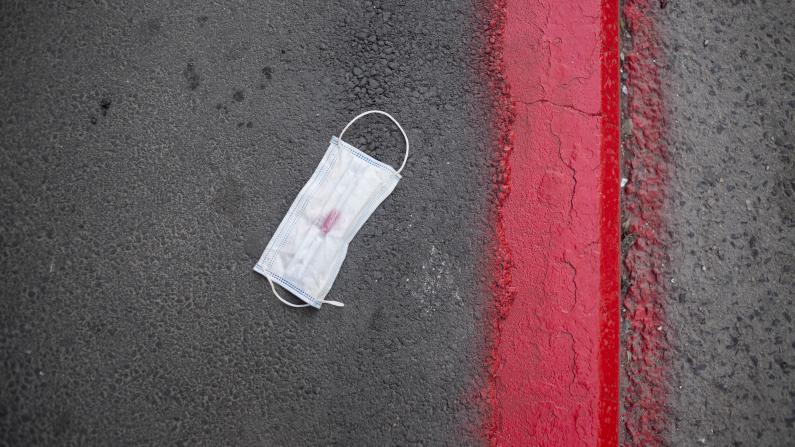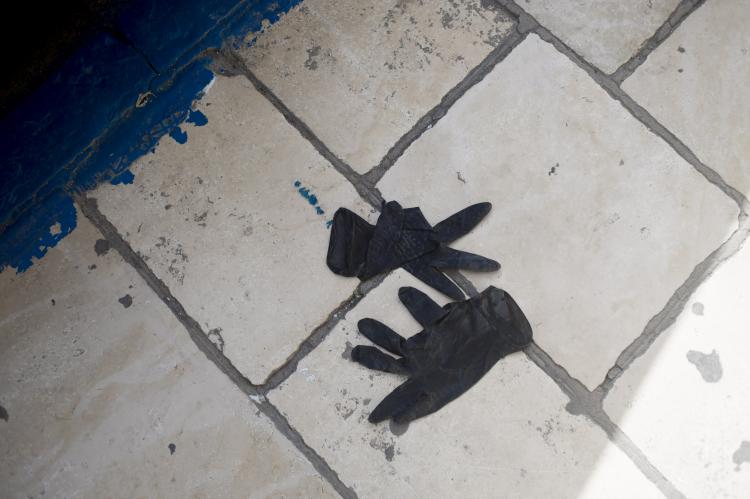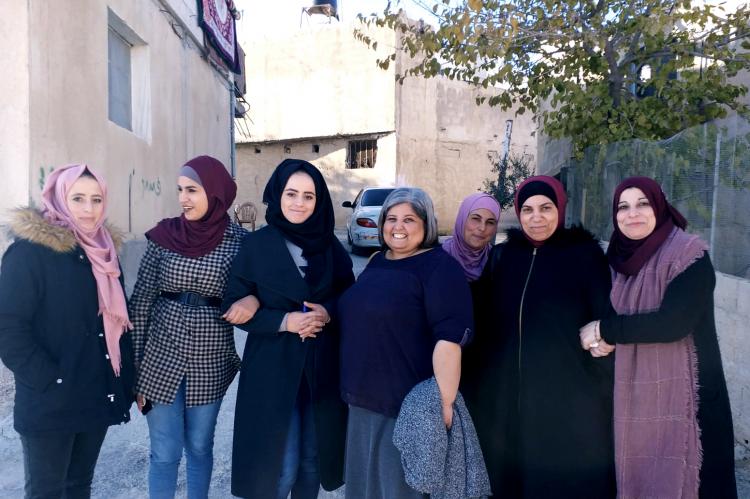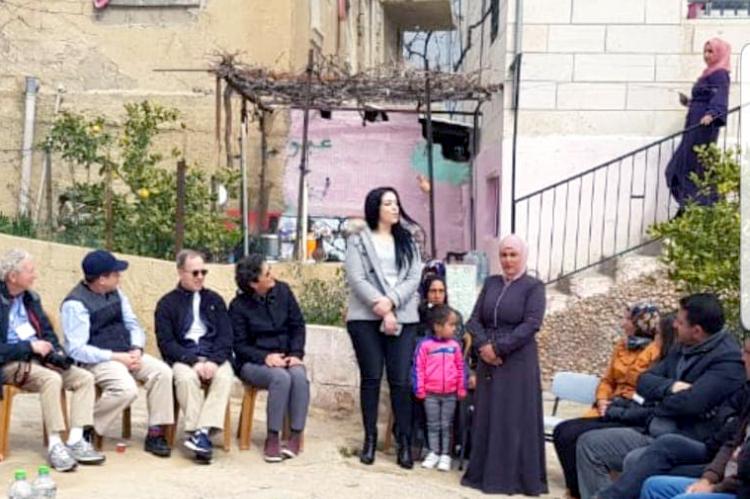
The West Bank sees a complex division into three areas with varying control by the Israeli and the Palestinian authorities. Some communities fall between the dividing lines of the occupation. Often times, they do not receive reliable healthcare and social services. For some villages, this means that they have to deal with the consequences of the corona crisis on their own. Their access to food and other basic supplies largely depends on their ability to self-organize. Fortunately, they have found a partner that helps them to overcome the challenges of community-based action. forumZFD’s partner organization, Taghyeer (which means ‘change’ in Arabic) believes that change can be achieved through self-development and non-violent action at the grassroots level. When the first coronavirus cases were registered in Palestine, the Palestinian Authorities started to impose lockdowns on many cities and villages in the southern West Bank. In response, Taghyeer organized a joint zoom call with representatives of 13 affected communities. In this first meeting and its many follow-up sessions, they supported communities in developing their own emergency plans. Since then, Taghyeer has assisted community leaders and grassroots activists to implement their own responses to the crisis.
Muhanad Alkharaz, Taghyeer‘s executive director, says that the challenges of the corona crisis are elevated by the occupation: checkpoints, the separation wall, and other restrictions on freedom of movement are now paired with lockdowns, curfews, and other limitations. This makes it almost impossible to get supplies into smaller rural villages, particularly in the southern West Bank. “By the end of ,ay we managed to distribute more than 500 food parcels to our brothers and sisters trapped behind the separation barrier north of Bethlehem. Due to the complete lockdown of the City of Hebron, movement to surrounding villages was largely prevented. We worked with small rescue teams, but it still took about three days to secure the needed permits and deliver the aid.”
One of the communities that is most affected by the corona crisis is the village of Jub Al-Deeb, located only 6.5 km south of Bethlehem, in Area C of the West Bank, where Israel retains near exclusive control over law enforcement, planning and construction. The community is isolated from larger Palestinian towns by the surrounding settlements. Even before the crisis, residents sufferd from frequent confrontations with the Israeli military as well as settler violence and house demolitions. Living in Area C, residents require permits by Israeli authorities for any construction work.In practice, these permits seem nearly impossible to obtain, even for small endeavors like the installation of street-lighting. A few years ago, a group of women from the village decided to take matters into their own hands. Ever since, they have emerged as community leaders and negotiated with authorities to bring electricity, water, and even solar panels to the village. What started as an informal initiative of a few women has since formed into a strong and active women's society. As part of forumZFD's and Taghyeer's joint efforts to strengthen community leaders, forumZFD has been working with the women's group on a campaign to bring street lighting to the village. Then, the corona pandemic curbed these plans as more pressing needs started to surface.
ISRAEL & PALÄSTINA: Die gefährliche Zeit ohne Todesopfer überstehen
Siham Fayad, Projektmanagerin beim forumZFD Jerusalem, stand in engem Kontakt mit der Frauengruppe Tagheer („Veränderung“), als sich die Lage von Tag zu Tag verschlechtert. “Eine der Frauen hat sogar versucht, ihren Hochzeitsring zu verkaufen, um von dem Geld in Bethlehem Vorräte zu kaufen. Aber sie sind gar nicht bis in die Stadt gekommen“, sagt Siham. Aufbauend auf seiner Expertise im Bereich „Gemeinschaften mobilisieren“ entschied das forumZFD, den Frauen aus Jub Al-Deep bei der Bewältigung der Pandemie zur Seite zu stehen.
Fadia Al Wahsh aus Jub Al-Deep begrüßte die schnelle Reaktion: „Wir lieben unsere gemeinsame Arbeit mit Taghyeer und dem forumZFD und werden auch weiterhin unsere Vision für eine bessere und stärkere Gemeinschaft verfolgen. Aber in der aktuellen Situation liegen unsere Priorität und unsere Hoffnung darauf, die gefährliche Zeit ohne Todesopfer zu überstehen.“
(Iuna Vieira und Siham Fayad, Friedensfachkräfte in Israel & Palästina)
The Women’s Group in Jub Al-Deeb takes Crisis Response into their own hands
Siham, Project Manager at forumZFD Jerusalem, was in close contact with the women as the crisis intensified day by day. “One of the women even tried to sell her wedding ring to be able to buy supplies from Bethlehem, but they couldn’t even reach the city”, Siham says. Together with Taghyeer and based on the needs expressed by the women of Jub Al-Deeb, forumZFD decided to redesign their project to address the challenges of the crisis. For Fadia Al Wahsh, head of the Women Society of Jub Al-Deeb, this flexibility was not only welcomed but truly needed: “We love the work we were doing with Taghyeer and forumZFD, and we will always follow our vision for a better and stronger community! But for now, our hope and priority is to survive these dangerous times with no casualties.”
Fadia (Jub Al-Deeb) and Tamar (Taghyeer) lead and represent the community in an activity to expose the international community to the challenges and needs of the village before the corona crisis.
The majority of Jub Al-Deeb’s income is generated by the men, who are working in Israel on daily wages as farmers and construction workers. Due to the lockdown, they cannot travel and therefore lose their income. Caught between the Israeli and the Palestinian authority and surrounded by illegal Israeli settlements, the village was cut off from food supplies and other necessities. Fadia Al Wahsh, explains how these conditions made it all so much harder to deal with the new challenges of the corona outbreak: “We are such a small community. Many of us still do not have social media or TVs to follow up on the corona situation. This makes it challenging to understand why it is so important to stay at home. We also do not have access to adequate health care here. So far, the mobile clinic only visited us once since the lockdown.”
"They know what’s best for their community”
Although forumZFD is usually not involved in humanitarian work, Project Manager Siham explains that sometimes being a true partner requires to follow the lead of those who work on the ground:
“It was important to support the women in deciding for themselves what they want to do. In our work in community organizing, we see decision-making as a form of power – we cannot help people to recognize this power and then take it away in such a situation. They know what’s best for themselves, and we can only support them in their strength to take control of their lives and their future.”
With the support of Taghyeer and forumZFD, the women now support their community through organizing and distributing care packages with food and sanitary goods to the families in the village. Siham is helping these efforts from her home office in Jericho. Via video calls, she closely coordinates with her counterpart, Tamar Hassassian, from Taghyeer. Tamar says that overall, the movement was able to quickly adjust to the crisis and to respond to the different needs of the community: “Now we have the time to reflect and make plans. Every day, we are thinking of new and creative ways to stay connected with our partners in Jub Al-Deeb and our activists in the field.”
Siham Fayad, Project Manager at forumZFD is in touch with her partners from Taghyeer every day, as she works from her house in Jericho. Her twelve-year-old niece Nour kindly allowed her to set up a home office in her room, which has the strongest internet connection.
Stories like the one of Jub Al-Deeb make visible how the conditions of fragmentation and prolonged occupation intensify the challenges that come with the global corona crisis. But they also show how incredibly resilient, self-determined, and united communities are when it really matters. While others are able to rely on institutional support and governmental responses, many Palestinian communities are now leading their own way out of the crisis through self-organizing and bottom-up initiatives. The corona pandemic has proven just how essential community-organizing is for Palestinians who are falling between the dividing grids of the occupation. forumZFD is proud to work alongside Taghyeer to support these efforts throughout and beyond the corona crisis.
To find out more about the work of our partners from Taghyeer visit their website and facebook page!



